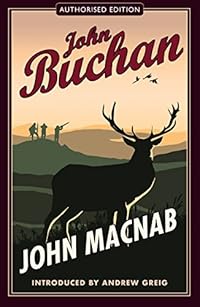John Macnab by John Buchan
Posted in Andrew Greig, Reading Reviewed, Scottish Fiction at 12:00 on 12 October 2015
Polygon, 2007, 274 p (+ v p introduction by Andrew Greig.) First published 1925. Returned to a threatened library.

I would not normally have picked this up but when I saw the cover and that the introduction was by Andrew Greig I realised his The Return of John Macnab (on my tbr pile) must have some relation to this original, first published in 1924.
In it, three professional men, one a Cabinet minister, all bored with their lives, get together as “John Macnab” to send out a challenge to three Highland landowners that they will poach a stag or salmon on their land, remove it, then later return it, with money for charity depending on the result either way. The book is merely the unravelling of this premise and the delineation of the incidents which occur in its prosecution. It does give a peek at the huntin’, shootin’, fishin’ brigade of the Western Highlands in the 1920s.
It is none of the three gentlemen however who is the book’s most rounded and intriguing character. That accolade belongs to Janet Raden, daughter of the owner of one of the estates to which “Macnab” issued his challenge. To their host Sir Archibald Roylance, who has fallen tongue-tiedly in love with her, she at one point says that the old aristocracy is dying because it deserves to, “We’ve long ago lost our justification.” However, in his introduction Greig says of her, “Like all Buchan’s good women she is essentially a chap,” a view to which there is more than a grain of truth.
It is not too surprising in a book concerned with field sports that descriptions of landscape should be prominent but this also places it in common with a swath of Scottish writing.
The authorial voice perhaps pokes through when we are told that “It is a melancholy fact which exponents of democracy must face that, while all men may be on a level in the eyes of the State, they will continue in fact to be preposterously unequal.” Here meaning if you’re used to ordering others – or being ordered – that affects how your actions are perceived and acted on.
To those of delicate dispositions I ought to say that – indications of the attitudes of the times in which it was written – there is more than one mention of Jews as being either fond of money or influential, an instance of the word “nigger,” and an utterance of the phrase, “I’m a white man, I am,” as an assertion of integrity.
The book is not really more than an adventure story. It will be interesting to see what Greig makes of the premise.
Pedant’s corner:- The Miss Radens (The Misses Raden.)
